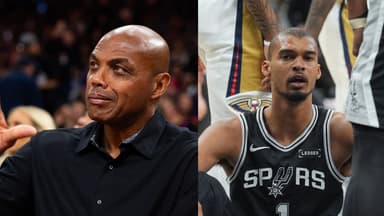Without building a rapport with teammates who are also good enough to achieve the common goal one is chasing, achieving success in any team sport is impossible. Charles Barkley knows that very well. The Hall of Famer was one of the prominent players of the 1990s, but he only ever competed in one NBA Finals. It’s unfortunate for a player of his caliber, but it taught him a lasting lesson about the importance of chemistry.
Advertisement
According to Barkley, his Hall of Fame career didn’t translate into team championships because he was only part of a few teams that had good chemistry.
Chuck spoke about this topic during a recent seminar titled An Evening With Charles Barkley, where the basketball legend discussed his success not only in the league but also on television. One audience member asked him about the secret to maintaining chemistry with his Inside the NBA crew, and Barkley used the question as an opportunity to talk about teamwork in general.
“Chemistry is important on all teams. And as coach knows, it’s very difficult to get chemistry. I played for 15 years, and I probably on had 5 or 6 teams that had great chemistry because everybody has a different agenda. That sounds bad, but it’s really not that bad because everybody’s got to be on the same page,” he stated.
Barkley wasn’t wrong. He has always been vocal about his time on the Philadelphia 76ers, which was mainly him carrying a struggling franchise. He admitted that he was a better player in Philly, but found more success in Phoenix due to the stronger team environment.
To further drive home his chemistry point, Barkley revealed a unique trick done by his friend Shaka Smart, the current head coach of Marquette University.
“He does an anonymous survey. I think this would be great for every coach. He says, ‘Tell me who should be starting and how many points you’re going to average.’ It’s anonymous. He says, ‘Every year I got 12 starters and we’re going to average 195 points a game.'”
“Every player thinks they’re a starter and every player think they’re going to average X amount of points. But to get that chemistry, you can only start five. Those five coming off the bench can’t take it personally. Just play when it’s your time to play. So getting chemistry on a team is really hard.”
Barkley later mentioned how some of the best players in the world, like his good buddy Kevin McHale, started on the bench. He claimed that all bench players who are bitter about not starting should have this mindset.
“‘When I come off the bench, I’m going to play my a** off and I’m either going to help the team win or the coach going to realize that I should be starting. The coach going to have to make a decision. A coach knows, ‘You might not start, but your a** is going to be in there when the game is on the line,” he added.
Finally, Barkley mentioned how the great Pat Riley, who brought unprecedented success to Miami in the form of three NBA championships, had a clear ideology when it came to building team chemistry:
“Voluntary cooperation. He says, ‘Unless you have voluntary cooperation from all your players, you can’t win.’ Because hey, I can only play five. Do I want to play eight? I can only play five at a time, but you other three are going to have to trust me. And that’s how you win.”
Talent only gets you so far without real chemistry. It’s what keeps a team together when things get tough. His stories show that success comes from players trusting each other and buying in. Coming from someone who’s seen it all, that’s advice worth listening to.







